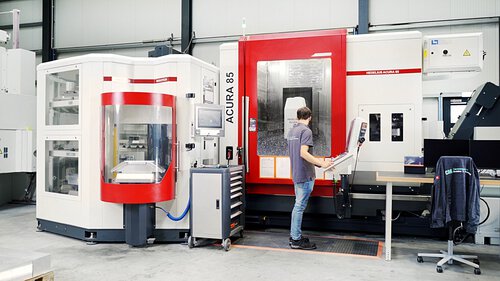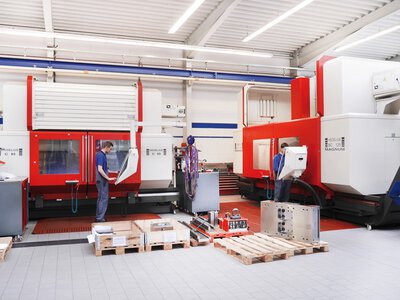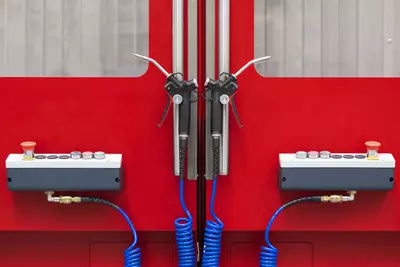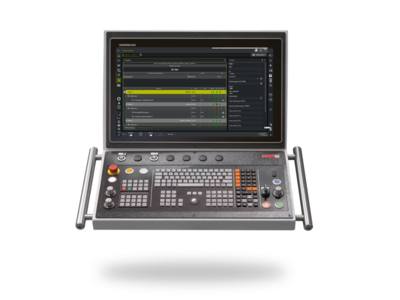LWM Werkzeug- und Maschinenbau GmbH
ACURA 65, TILTENTA 7-2600 | Application area: Tool and mould making | Company headquarters: Vechta, Germany | Employees: 25
This is the fourth HEDELIUS that Alwin Lamping, owner and managing director of LWM Werkzeug- und Maschinenbau GmbH, has in his machine park. The toolmaker from Vechta did not hesitate for long with his latest investment. He experienced the ACURA 65 live under chip removal at the last AMB in Stuttgart and was immediately impressed by the extremely compact high-performance machine.
The new machining centre has already paid off at LWM in recent months. Many single parts are manufactured on the ACURA 65, e.g. dies for extrusion tools and heads for melting pipes. The speciality: Some of the workpieces are clamped before the weekend and then run unmanned over the weekend. Machining workpieces without the intervention of an operator is a fundamental issue at LWM. "Some tools have running times of two to three weeks, so the machines run around the clock, at weekends and on public holidays," Lamping explains.
Over the past twenty years, LWM Werkzeug- und Maschinenbau GmbH has developed into a medium-sized tool manufacturer that has made a name for itself in particular with tools for thermoplastics and elastomers.
Successful mould maker for the plastics industry.
Over two decades, Lamping has built up a successful tool and mechanical engineering company with 25 employees from a side business after work. In the early days, the trained metalworker manufactured tools for a partner in the plastics industry on an area of just 150 square metres. Today, production takes place in three halls for national and international customers, including those from the construction and automotive sectors. LWM's tools can be used to produce construction and façade seals, as well as profiles and seals for motor vehicles.
"Our tools are used to produce seals for doors in hotels, museums or airports, for example," says Lamping. However, his company has not focussed on just a few industries, but works extremely flexibly. "If someone has a problem, we release it. You just have to come up with something," says the entrepreneur, describing the philosophy of his operation, and continues: "Our customers' requirements are very different, but always high." LWM often only works according to projection drawings, without detailed specifications. In addition to mould making, LWM in Vechta also builds special machines for plastics processing, particularly for the manufacture of elastomers.
Diversity and complexity as a recipe for success.
The high flexibility of the medium-sized company is also reflected in its production. Almost exclusively single parts are manufactured here. The product spectrum ranges from extrusion heads and guide pieces for extrusion tools to complete injection moulding tools with a weight of up to four tonnes. The diversity and complexity of the products is also part of LWM's recipe for success. "Where our expertise is in demand, there is less competition," says Lamping. "You have to have expertise and build up a reputation." He himself places the highest demands on the functionality and quality of the products he manufactures. "We test our products very thoroughly before they go to the customer. I have to ensure that they work." LWM uses four HEDELIUS machining centres, among other things, to meet the high expectations of its customers and its own standards of quality and functionality.
Long lead times without operators.
The business relationship between LWM and HEDELIUS began 15 years ago. "I needed a machine for the manufacture of tools for sealing rings," Lamping recalls the purchase of his first HEDELIUS, the BC 125 3500. "HEDELIUS was the only company that could build the machine the way I needed it." The machining centre has been in continuous use ever since. "There hasn't been a Christmas without the BC 125 running," reports Lamping. "The machines work continuously, you just have to let them work in peace."
LWM has grown over the years. And the machinery has grown with the company. A C80 2300 and a TILTENTA 7-2600 were added from HEDELIUS. The ACURA 65 followed last year.
Some components and injection moulding tools often require long tools, especially long drills with small diameters. "We need a lot of flushing pressure for deep hole drilling, which is why we opted for pressure booster pumps," says the entrepreneur, explaining why he equipped both the TILTENTA 7-2600 and the ACURA 65 with a pressure booster pump.
Tools always available.
What stands out about the HEDELIUS machining centres at LWM are the standby tool magazines behind the TILTENTA 7 and the ACURA. For Lamping, the advantage is clearly open: "We need a lot of tools. The tools in the magazine are all measured. I can therefore produce unmanned at night because all the tools I need are in the standby magazine." Michael Lamping, son of the owner and who has also been working in the family business for some time, agrees: "I wouldn't take another machine without a standby magazine."
HEDELIUS machining centres of the customer.
In accordance with market demand, HEDELIUS has made the tried-and-tested TILTENTA 7 significantly more compact with almost identical performance parameters. Discover our optimised bestseller: TILTENTA 7 NEO.
More testimonials.

At Carstengerdes Modellbau und Zerspanung GmbH in Bockhorn near Wilhelmshaven, state-of-the-art technology meets a family working environment characterised by genuine appreciation. With the ultra-modern 5-axis machining centre ACURA 85 and the MARATHON 518 pallet handling system, the company focuses on automation and technical innovation - a major step forward that not only increases efficiency, but also offers young talents enjoyment of their work and long-term prospects.

Thanks to automation, IWK Verpackungstechnik has been able to significantly increase the production capacity of its HEDELIUS machining centres. By integrating a robot cell, the CNC operators gain valuable time that they can use for the manufacture of single parts. This solution enables IWK to increase its flexibility and further expand production efficiency.

Circelli Engineering Solutions GmbH from Dulliken is one of the start-ups in the Swiss manufacturing scene. Originating as a small design office, the young company has developed into a system provider thanks to its passion and investment in innovative CNC technologies. The founding brothers and owners Paolo Circelli and Marco Circelli explain the role played by the latest FORTE 65 and ACURA 65 machining centres from HEDELIUS.























































































































































